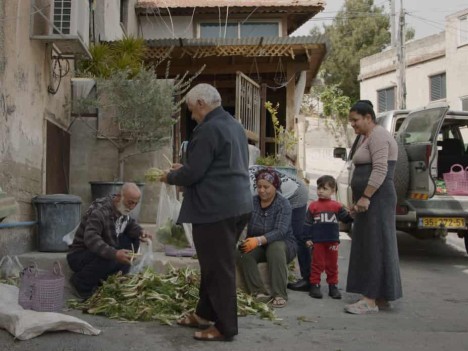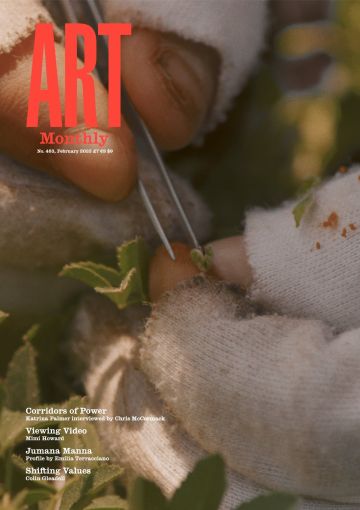Profile
Jumana Manna
Emilia Terracciano profiles the Palestinian artist and filmmaker

Jumana Manna, Foragers, 2022
In work that literally as well as metaphorically tests the boundaries, Jumana Manna reveals that the idea of trespass takes on a whole new level of significance in the context of the contested lands of Israel and Palestine.
To go for a walk might be a good way to measure the quality of your freedom, to follow the thinking of the lawyer Raja Shehadeh and his book Palestinian Walks: Notes on a Vanishing Landscape. Published in 2008, and written over a period of 27 years, Shehadeh’s walks crisscross the hills around Ramallah, the Jerusalem wilderness, and the ravines by the Dead Sea. Shehadeh invited a novel reading about the future of a disappearing land; paths once accessible have today become off-limits or destroyed; concrete was poured over the flora, and irreversible damage was brought about by those who claimed a superior love and divine right to the land. Evocative of the phenomenon known as ‘shifting baseline syndrome’, that is, the awareness of intergenerational changes in how one perceives the environment, Shehadeh’s freedom to roam is inversely proportional to his mental benchmark of normality. What younger generations of Palestinians accept as normal is a world that seems dramatically degraded to older people. In the face of the extensive building of settlements, the ugly reshaping of the countryside, and great damage caused to the land and its flora, Shehadeh asks: ‘from whom is the Israeli Society for the Protection of Nature protecting nature?’
Palestinian artist and filmmaker Jumana Manna poses a similar question in her latest 60-minute film Foragers, 2022. Composed of documentary, fiction, and archival materials, Foragers is mainly shot across Galilee, the Golan Heights and around Jerusalem. The film centres on the issue of Palestinian sovereignty through a focus on the right to walk and to freely harvest wild greens in Israel/Palestine. Manna traces the fugitive forays of Palestinian foragers in search of edible plants; these include za’atar (Majorana syriaca), a staple ingredient in Arabic foods, and the thistle ‘akkoub (Gundelia tournefortii), a culinary delicacy prized for its succulence and which is rich in fibre, vitamins, minerals and antioxidants. For centuries, Palestinians have harvested wild ‘akkoub plants, cutting them at the base and removing their thorns so that the leaves, stems and the undeveloped flower heads can be savoured. Both plants have been designated protected species under acts issued by the Israel Nature and Parks Authority in 1977 and 2005, respectively. Harvesting these wild plants can result in hefty penalties and sometimes arrest, yet the peculiar criminalisation of foraging pertains exclusively to Arabs; as one commentator puts it in the film: ‘if you ask Palestinians why that is, many would say that it is “because Arabs like it very much”.’ Domesticated varieties of these plant species are cultivated as commercial crops by Israeli growers who sell them back to Palestinians. In TV colour newsreel from 1978 we see a journalist interview an Israeli za’atar grower and entrepreneur; she asks him: ‘So you want to sell za’atar mixes to the Arabs? You want to sell ice to the Eskimos?’ As Foragers unfolds, it becomes starkly clear that the criminalisation of foraging is a strategic manoeuvre on the part of the Israeli state to make further lucrative business opportunities for Jewish crop-growers: ban the custom, create a consumer demand by outlawing the Palestinian from his/her land, and further his/her market-dependence.
From the Latin ‘foris’, designating ‘outside of ’, the word ‘foragers’ is etymologically linked not only with ‘forest’ (areas that exist outside of common law) but also to ‘forensic’. The word ‘forest’ is also tied up with the Norman invasion of England, the destruction of the commons, the creation of the Forest Laws and the rise of enclosures – protected areas and breeding grounds for the king’s flighty cash sacks: deer, fox and boars. As is well-known, the rise of enclosures suppressed commoners’ long-established patterns of sustenance. Today, foraging seems to have lost its edge: linked to refined botanical literacy, it is mostly a leisurely activity for the few who have an appreciation of seasonal change and a desire to connect with the environment in order to understand where food comes from. Manna makes it clear to viewers that foraging in Israel/Palestine can be all of these things but also, for Palestinians, it is very much tied to subsistence, an enduring love for the land and a means of affirming life in the face of continued suppression.
What follows in Foragers is a querying of the legal notion of ‘protection’, its traction via legislative enactment and executive action in Israel/Palestine. Securing nature requires the control of untrammelled human activity and its supervision by those endowed with the expertise, foresight and wisdom to preserve what might be imperilled. In many cases, such endeavours have included visions to secure nature by secluding it from the twin impacts of human disturbance and runaway economic growth. In the case of Israel/Palestine, the issue of conserving biodiversity is deeply rooted in settler ways of understanding ‘land’, ways that reinforce social, economic and political hierarchies, abrupt acts that further erode a whole way of Palestinian life. In a beautiful sequence we see Manna’s mother, Aziza, gently tug at a plant in a field; in another, the hardy hands of an elderly picker, Zeidan Hajib, peel away the thorny stem of an ‘akkoub with a sharp blade. Foraging wild plants rewards those who harvest with care but also feeds those for whom reading the land is a matter of necessity and intense pleasure. The possibility that such practices might disappear and become extinct haunts Foragers; the conspicuous absence of youth in this film enjoins the viewer to consider questions of witnessing, attentiveness to loss and the fragility of Palestinian intergenerational knowledge.
Manna does not critique the notion of conservation per se, but does pose certain questions about how such activities raise dilemmas that are far-reaching in their implications: what are the origins and politics of settler colonialist endangerment narratives? Through a series of carefully scripted court hearings based on cases, put together with attorney and law doctoral candidate Rabea Eghbariah, Manna dwells on the legal enclosures through which captive Palestinian foragers are subjugated. The court hearings in which Palestinians stand accused of violating preservation laws bear witness to the inane but utterly brutalising and quotidian bureaucratic absurdity faced by largely middle-aged and elderly pickers – mothers, fathers and grandparents. Repeatedly, the ‘accused’ refuse to endow the presiding Israeli judges with any legitimacy, many of them vowing to continue foraging. In a sequence we see Manna’s parents return home from a foraging outing and display their ‘illegal’ harvest on the kitchen table. Hands busy themselves, selecting and cleaning the precious freshly picked greens. The voice of an Israeli TV presenter comments: ‘When someone calls to order ‘akkoub it’s like they’re ordering weapons or hash.’ Manna juxtaposes visual (the family harvest) and auditory components (such as a TV newsreel from 2019) to shed light on the self-serving nature of state-endorsed TV narratives.
Foragers returns to some of the themes Manna explored in Wild Relatives, 2019, a film about storage and conservation technologies devised by mighty and powerful agro-industrial institutions to preserve seeds designated ‘endangered’ and worthy of salvage over others. Wild Relatives centres on the magical stored properties of the plant seed; it pivots around the question of storage, recall and futurity of the seed. The concept of the seed-backup, it turns out, is always structured and contingent on the imagination of potential (totalising) disaster. Filming the relocation of a US-funded seed bank from Aleppo to Lebanon during the Syrian civil war in 2012, Manna focuses on the emergency recall of backups from the Global Seed Vault in Svalbard, Norway. The film ends with a glacial Arctic landscape animated by Lebanese pop tune Baadana (After Us). Singer Aida Chalhoub lulls: ‘After us who would water the grapevines? Who would fill the baskets?’
A film about the entangled ecological and social dimensions of anthropogenic extinction, Wild Relatives explores how conservation technologies interrupt processes of time, death and generations. Foragers, filmed closer to Manna’s home, dwells on the impact of settler conservation policies devised to protect plants at the cost of the human; as such, the film closely aligns with the more direct defence of life-affirming interactions between plants and people in Palestine. The intermingling of documentary, fiction and dizzying soundtrack (by Berlin-based Rashad Becker) deflects a more analytical-forensic approach as method of inquiry. Embodied and sensorial ways of learning and knowing place the sensing body at the heart of the film – relishing nature, picking, cooking and eating food with others, bathing, caressing one’s animal companion, even slashing an opponent’s car tyres. Manna reminds us that the body may well run up against, be bruised, pricked and punished by the power structures of the state (the national body politic) but through its gorgeous and vital recalcitrance it also regains something that is close to sovereignty.
Ultimately, Foragers celebrates a practice that historically abhorred domestication or one’s subordination to the hierarchical social order of the state, its sedentary and controlling agricultural systems. While scholars of the Palestinian national movement have often studied Palestinian resistance to Israel as related to the armed struggle, and the cultural struggle against the Jewish state, Manna shows that staying put and foraging in Israel are acts of defiance and resistance by Palestinians in their own right. Foraging registers as an instantiation of what Shehadesh called sumud (steadfastness) – a loving, obstinate refusal to acquiesce to terror – a joyous struggle for self-determination, and Indigenous food sovereignty. A case of you are what you eat.
Emilia Terracciano is lecturer in modern art history at the University of Manchester.
First published in Art Monthly 463: February 2023.









